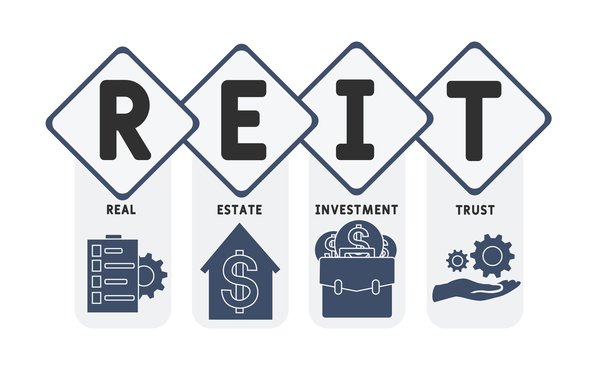There are several strategies you can take to investing in real estate. You can buy a single rental property, start a billion-dollar real estate fund, or choose one of dozens of other methods in between. How you choose to structure your real estate business depends on your overall goals and the capital and resources you have available.
One strategy that's growing in popularity is to raise capital through syndication with a private offering. However, knowing how to start a real estate investment trust, or REIT, may provide you with an option that's better suited for your situation.

What exactly is a REIT?
A REIT is a real estate investment company that owns or finances investment properties that produce income, distributing earnings to its investors in the form of dividends. In fact, a REIT has to distribute 90% of its taxable income to its investors.
There are two types of REITs: equity REITs and mortgage REITs. Equity REITs are what most people are familiar with. They invest in income-producing real estate. Mortgage REITs provide financing for real estate as well as buy existing mortgages.
How is a REIT different from crowdfunding?
REITs and crowdfunding may seem like virtually the same thing. The investors provide capital, the REIT or crowdfunding sponsor purchases real estate, and the investors earn a return on their investment.
One of the main differences, however, is that investors typically are investing in a specific deal with crowdfunding. The sponsor raises money for that deal, the investors all get a piece of the cash flow, then, once the property is sold, the investment is over. Each deal is a separate transaction.
REIT investors, on the other hand, are typically investing in a portfolio of properties. This portfolio will usually change over time as the REIT's management team will dispose of poorly performing properties to invest in properties with a higher return. They also usually continue to add more real estate assets to their portfolio as more investors purchase shares.
An investor's capital is usually tied up for several years when they invest in crowdfunding. The same is normally true with private REITs. However, publicly traded REITs can be bought and sold whenever the investor wants
Why start a REIT?
REITs have more flexibility than equity crowdfunding or real estate syndication. You don't have to raise capital for each individual deal and possibly miss out on deals because you can't act quickly enough.
A REIT is an ongoing operation that can move in and out of investments to maximize the return. Investors essentially agree to trust you with your asset management abilities to give you more flexibility on how to best use the capital available. With a syndication, you have to sell investors on your vision and plan for each specific investment you want to make.
One of the most popular reasons to start a REIT is the tax benefits. A REIT isn't usually taxed on the trust level. Instead, the investors are taxed on their dividends.
One of the main requirements of a REIT is that they have to pay out at least 90% of their taxable income as dividends. Notice I said "taxable." Since depreciation is a major noncash expense used as a deduction for taxes, a REIT almost always pays out at least 100% of their taxable income. This leaves money in the REIT that isn't taxed and can be used for other investments.
How to start a REIT
The Internal Revenue Service (IRS) requires you to reach certain thresholds before classifying you as a REIT, and there are specific requirements you must continue to meet. The following steps are a common strategy investors use to start a private REIT.
Decide what type of REIT you want to form
Unless you're already sitting on a $100 million-plus portfolio of real estate, you'll probably be starting out as a private REIT. Beyond that, you'll decide whether you're going to form an equity REIT or a mortgage REIT.
With equity REITs, there are several niches that involve different property types. Investors are usually more interested in these because they know what they're investing in. The various types of REITs you could form are:
- Retail REIT
- Office REIT
- Industrial REIT
- Multifamily REIT
- Residential REIT
- Healthcare REIT
- Hospitality REIT
- Infrastructure REIT
- Data center REIT
- Self-storage REIT
- Timberlands REIT
- Specialty REIT
Once you have a plan for what you want to do, the following steps will take you from idea to REIT status.
Form a taxable entity
You, along with any partners, must first create a corporation that will later become the REIT. Since certain requirements still have to be met, this is often set up as a management company. This is the best time to put a very specific operating agreement in place between you and any partners. This will determine how the company will be managed moving forward.
Draft a Private Placement Memorandum (PPM)
You should get the help of an attorney for this part. The PPM will provide very specific details of the company. Some of them will include:
- The objective.
- Profiles of the management team.
- The company's financial information.
- How profits will be distributed.
- Fees.
- Rules for how investors can sell their shares.
- Risks.
- Agreement between the company and investors.
The private placement memorandum is what you will be providing to potential investors. Having a clear objective and thorough details will go a long way in making investors feel comfortable with your company.
Find investors
Your company will need at least 100 investors to be classified as a REIT. You don't necessarily need to get all 100 up front, since the IRS only requires you to meet that threshold by the beginning of the REIT's second tax year. However, losing your REIT status for not having enough investors would be bad for investor relations. Most REIT startups will get commitments from at least 100 investors before moving forward.
It's important to note that five or fewer investors can't own more than 50% of the shares in a REIT or it will be taxed as a personal holding company.
Convert your management company into a REIT
Once you're ready to move forward in your REIT startup process, you'll need to change your company's structure from a management company to a REIT and amend the certificate of incorporation you filed.
Transitioning the company into a REIT will also involve filing IRS Form 1120-REIT with the IRS when filing taxes. This is the form that will request the information to verify you meet the criteria to be taxed as a REIT and the form you will continue to use when filing taxes.
Maintain compliance
Starting a REIT isn't a one-and-done deal. You must continue to qualify in order to receive the same tax treatment.
The ongoing requirements for a REIT are:
- Pay 90% of the REIT's taxable income to investors in dividends.
- At least 75% of the REIT's assets must be in real estate, or real estate mortgages, quarterly.
- At least 75% of the REIT's gross income must come from rental income or mortgage interest.
- A maximum of 5% of the REIT's income can be from nonqualifying sources such as service fees or other types of business income.
Of course, this isn't an all-inclusive list. The IRS provides a full list of the requirements to be taxed as a REIT.
Taking your REIT public
Taking your REIT public is the big payday and the opportunity to grow into a multibillion-dollar publicly traded REIT.
While some REITs have had an initial public offering (IPO) to raise as little as a few million dollars, most wait until their value reaches at least $100 million. The time it takes to be able to take your REIT public will depend a lot on the amount of capital you were able to raise from investors in the beginning and the size of the real estate investment portfolio you started with.
Going public isn't a simple process, and it's definitely not a cheap one. There is a lot of red tape, and the initial cost is normally several hundred thousand dollars. You also have the additional expenses once your REIT is public as well as stringent reporting requirements.
Hassles and expenses aside, it's a great target to aim for. If you manage your REIT properly, it's achievable.
The bottom line
Starting a private REIT is an excellent way to raise capital from investors while maintaining the flexibility you need to manage the assets in a way that will allow you to increase everyone's returns. Starting a REIT will also help you scale the size of your portfolio faster than many other options.
Of course, starting a REIT isn't the best option for every real estate investor. Take a careful look at your short- and long-term real estate goals to determine if the REIT structure is right for you.
If you have limited experience and knowledge, you'll probably want to start with a few syndication deals to build a successful track record. This will be important for attracting investors, especially since they will have to put a lot of trust in you to manage their REIT investment. Either way, knowing how to start a REIT will help you significantly while creating your roadmap to operating your public REIT.





































